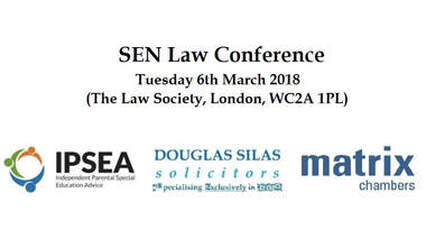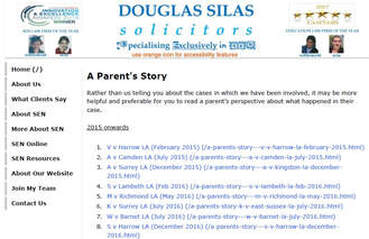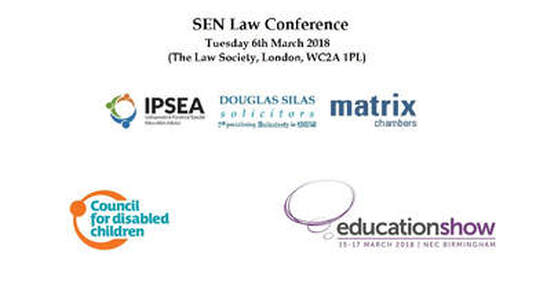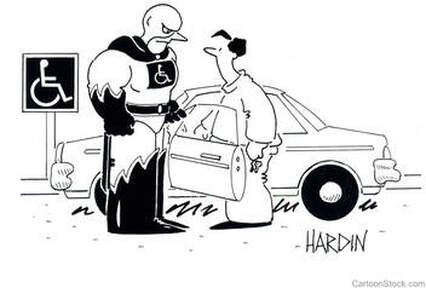|
Let me wish you for a belated Happy New Year and wish you for a good and peaceful 2018. This is my first update of the chronological year 2018 and we are also now about a third of the way through the academic year 2017/18. In this update, you will find sections entitled:
As I always say, I know how busy everyone is, so please feel free to read just the sections that are of interest to you or read everything; the choice is always yours. Don’t forget, to ensure that you never miss out on one, you can get my SEN updates personally by completing your email details below, using our App ‘SEN.fyi’, or by following me on one of the Social Media platforms that I use, at the top of this page. You can also easily share this update with others (please only do so if it may be relevant to them) by using one of the icons to the right of this page (if on a computer), at the bottom of this page (if on a mobile device), or on our 'SEN.fyi' App (by using the ‘share’ feature at the bottom of the page). TICKETS SEEM TO BE GOING QUICKLY Hopefully, you will have heard from me earlier this week with further information about the new annual SEN Law Conference on Tuesday 6 March 2018 that I am staging jointly with IPSEA and Matrix Chambers. I announced it in my last update and gave some general information then but, as promised, I have included more specific details in this update, which you can also now find on the flyer attached to this email. You will see that the venue has now been arranged for London (where most people expressed a preference for it to be held) and has been confirmed as being at The Law Society. There are also seven confirmed speakers, who (in alphabetical order) are as follows:
We have consciously chosen speakers who can provide a number of views about what is happening in the world of SEN from the differing perspectives of parents, local authorities, Ofsted and the local government ombudsman, as well as from lawyers. As we have said, this one day specialist SEN Law Conference will provide legal and policy updates across all aspects of this fast-moving and developing area of law. The conference is aimed at SEN law professionals working with the following:
I am very excited about this conference (as I would attend it, even if I was not involved in helping stage it). I am also delighted that, since starting to take bookings in December, tickets seem to be going quickly. Whilst this is not a ploy to get you to buy a ticket ;-), if you do want to come, may I suggest that you book your place now as soon as possible, to ensure that you are not disappointed later by finding that there are no places left. I have also been asked to point out that tickets for the event are £225, but there is currently an early bird discount for tickets, which are currently reduced to £195 but this discount only applies to tickets paid for by 19 January 2018 (i.e. this offer is now only open for another week). Please note, any profits from the event will be donated to IPSEA, a charity offering free and independent legally based information, advice, support and training to help get the right education for children and young people with SEND. You can book a place at www.senlawconference.co.uk and can find further information on the attached flyer (if you get this update by email – otherwise it is on the website). "IT’S MADE US BETTER PEOPLE" You may have been aware (either directly or indirectly) that there was a fair amount of media coverage about SEN issues at the end of last year (e.g. the BBC’s ‘Breakfast Time’ focus on SEN in the week at the end of November/beginning December 2017). Whilst many of the issues were things I know from my own experiences in professional practice, (which you can find here), I was struck by one of the pieces called ‘It’s Made Us Better People’ by parents/presenters Carrie and David Grant who have four children with differing special educational needs. Whilst I realise, of course, that there are sometimes many (and continual) difficulties trying to get the right specialist support/provision/placement for a child or young person with SEN/Disability, every once in a while, it is good for all of us (both personally and professionally) to remember that these children and young people can also have a profoundly positive impact on us as well, by helping us to see the world in a ‘different’ and often unique way. I encourage you to watch it if you can (you can find it here: ‘It’s Made Us Better People’). IT’S ALL ABOUT (A PARENT'S) PERSPECTIVE Which also leads me on nicely to this next section... As many of you may already know, rather than telling you about the cases in which we have been involved, there has been on my website for many years a section entitled ‘A Parent’s Story’, as I think that, it is sometimes more helpful and preferable for you to read a parent’s (or grandparent’s) perspective about what has happened in their case. I have done things like this, as I know that many parents (and grandparents) of children and young people, tell me that they draw strength and insights from reading about what other parents (or grandparents) have experienced and gone through, especially where they read about other people succeeding, even where they think that there is no hope left. I have always been taken (again both personally and professionally) by things that people have said (I warn you that it can be quite emotional to read some of them), but have not had a chance these past couple of years to update this page regularly. However, at the end of last year I found some time to add a few more stories that parents have kindly sent to me, which you can read here: ‘A Parent’s Story’. I hope to be able to update it again in the next year or so, but hope that other parents can read those that are there now and realise that there can still always be a positive outcome to their situation, no matter how bleak things may seem now. RECENT/FORTHCOMING SEN EVENTS In my last SEN update, I referred to the Westminster Education Conference taking place on 9 November 2017 entitled: ‘Next Steps for SEND Policy – SEND Reforms, Funding, Local Area Inspections and Best Practice in Provision’. Unfortunately, due to scheduling difficulties, I was unable to attend it personally, but still obtained a transcript of the event afterwards, which was very interesting to read. Again, I was struck by one of the keynote speeches given by Dr Adam Boddison, the current Chief Executive for nasen (the National Association for Special Educational Needs). His talk was entitled: ‘SEND policy – Key issues and next steps’ and he spoke about issues concerning accountability, funding, inclusion and other related things. I was surprised to learn that there are now more pupils than ever before at special schools (although, to be fair, there are also more pupils generally) and he also said that 44% of children with Education, Health and Care (EHC) Plans are now placed in special schools. When talking about inclusion, I was also surprised to learn from him that children and young people with SEN are still seven times more likely to be excluded from school (he said that he felt strongly that no child should ever be excluded from school). Adam also pointed out that some mainstream schools now seem to be magnets for attracting children and young people with SEN and that other mainstream schools seems to be happy just referring them onto them, rather than taking them in. For me, the most telling thing that Adam said (which I have also found from my professional experiences) is the importance of making sure that an EHC Plan is right from the outset and also all along, as it can affect a child and young person’s education/provision/placement later when Post-19 (or as I have seen, in Post-16 cases as well). In terms of other forthcoming events, those that I think might be worth going to are:
“CAN’T YOU USE ANOTHER PARKING SPACE?”
I always like to end these ‘SEN Updates’ with a personal story, from my perspective as a physically disabled person using a wheelchair. In this update, I want to share with you a situation that I seem to encounter on an almost daily basis - parking spaces that are reserved for disabled people, being used by non-disabled people, which means that I cannot use them. You will be very surprised about the amount of times that this happens to me, even though I no longer am able to drive... Let me say from the outset, that I do realise that there are a number of people out there who have ‘invisible’ disabilities, which may make them look like they do not need to use a disabled car parking space (e.g. chronic medical conditions that significantly impair normal activities of their daily living, but who may show no outward signs of their condition), but they usually have validly been provided with a ‘Blue Badge’ exemption. I also realise that there are non-disabled people who sometimes need to use a disabled car parking space from time to time, because they are with a disabled person who they need to easily drop off or pick up, who sometimes may not be validly displaying a ‘Blue Badge’. Unfortunately though, there are lots of non-disabled people who innocently think that it is perfectly alright to park their car in a disabled parking place, either when they are still sitting in their car, to say, pick up or drop somebody somewhere, or also when they say they are only popping out for a minute to pick someone/something up. They will often say, when asked, that they are happy to move their car - but that misses the point, I (or someone on my behalf) shouldn’t have to ask them in the first place, as they should not have parked there anyway! Parking in disabled spaces when you are non-disabled is similar to those people who do not have children with them who park in the ‘family’ reserved car parking spaces in supermarket car parks. This is also a subject that I know that upsets many people – in fact, a friend told me once that someone who was without children refused to move from a space when she (who had her children in her car) asked, because the person said that, even though they were not with her, she had children at home! (You couldn’t make that up). But what seems to cause most difficulties and what I am really talking about here, is non-disabled people who just park in a disabled parking space without a ‘Blue Badge’, often purely because they do not want to have to walk too far somewhere or, worst of all, non-disabled people who park in a disabled car parking space and display a fraudulent ‘Blue Badge’ or one that they have ‘borrowed’ from somebody else. The regulations as to the way you can use a disabled car parking space by only displaying a ‘Blue Badge’ validly are actually quite detailed; I have even known of some cases where disabled people who have a valid ‘Blue Badge’ have sometimes found that they have still been ticketed wrongly, because they displayed it incorrectly and/or a traffic warden or similar has not seen it. My experience is that too often I am faced by non-disabled people blocking disabled car parking spaces unlawfully and without good reason. The surprising thing to me is that when I (or usually others on my behalf) then tell them that I need the space, in order to avoid the difficulty of walking or pushing myself to the entrance of the place I need to get to, I find that, on many occasions, these non-disabled people can become quite aggressive, even though they may have been asked politely to move. You will be amazed at the amount of bad language and behaviour that I have witnessed over the years, usually directed at others on my behalf. I have also noticed that it is usually other people who seem to get more upset for me about a non-disabled person (or somebody looking non-disabled) using the space without displaying a ‘Blue Badge’, and it is actually then me that needs to point out to them that the other person may have an ‘invisible’ disability that we do not know about. Non-disabled people parking in disabled spaces with/without a ‘Blue Badge’ is something that irks a lot of people around me. I often find people I am with wanting to retaliate/have a go at people who do this, and wanting to make the point that they (the other people) are non-disabled and could park their cars somewhere else and walk, whereas I cannot. For example, my wife, Erica, has even sometimes asked someone who is not willing to move if they want to come and look at my wheelchair in the back of our car (which, unsurprisingly, no-one has ever wanted to), but usually they have just ignored or pretended not to hear her and quickly walked away from their parked car – it is as if they do not want to hear or see the problem that they have caused, as if it then doesn’t exist or matter – ‘out of sight, out of mind’ as they say. Erica and others around me often remonstrate with people when they see them doing this and like to point out to them that they are being incredibly selfish by not thinking of other people. I even remember one very fit and strong looking young man in the gym car park walking away after parking his car in a disabled space and not looking back when he was asked to move (probably due to embarrassment), saying that he didn’t want a fight - again, it is like a form of denial by doing this as, if you do not look at it, you can possibly pretend that it is not happening. I have also noticed that the offending non‑disabled people often try to not make any eye contact with me (again, probably due to embarrassment). They just try to ignore me and pretend that I am not there. It gives another meaning to the phrase 'invisible disability'! I have also noticed that, when somebody realises that they may be doing something wrong, they are usually already very defensive, even before you say anything to them; it is almost as if they are ready for a fight, as they become immediately aggressive (some may say that this is just them being ‘defensive’). I have found from experience, that the best way to approach this situation usually is to quickly try to deflate it, by being as nice as possible and trying to ask them as politely as possible, if I can use the space (I find that saying that you need it more than them, or at the gym [which I have to go to train for health reasons] and I am tempted to say that, if they are going to the gym, they should be more able to walk than I am, does not usually tend to end well, as they often become even more aggressive). Non-disabled people do not seem to realise how difficult it can be for someone like me who is physically disabled, to have to ask them to move, especially if I know that I will be met with a very hostile or defensive reaction. When you think about it, I sometimes cannot even speak to them without first getting the car that I am in to sometimes have to park a long way away and then make my way back (usually slowly) to where they are to speak to them – this is even more frustrating when I found that they or their car has then gone. It has also placed me in a dilemma sometimes when I see people who I know and like, doing something wrong like this, as I know that telling on them would get them into trouble, because they are parking somewhere that they shouldn’t, often by using a forged or someone else’s ‘Blue Badge’. My favourite situation though is when there are no other spaces free, and I/another person asks politely if a non-disabled driver can move their car from the disabled car parking space which they are blocking, they just ask: ‘Can’t you find another parking space?’ The point that I want to get over is that, rather than telling people that they shouldn’t do this sort of thing after the event, I really hope that people will learn from what I am saying here and not do this in the first place. Just like other things I have talked about in this update, it gives you something to think about… With good wishes Douglas P.S. I always find it helpful to find out what people think about my updates, so please take a few seconds to tell me what you think by
There are just 3 quick questions. Comments are closed.
|
Archive
March 2022
|
© Douglas Silas Solicitors 2005-24
Authorised and Regulated by the Solicitors Regulation Authority (SRA no: 643718)
‘Douglas Silas Solicitors’ is the trading name of ‘Douglas Silas Solicitors Limited’, a limited company registered in England & Wales (company no: 10689991), whose registered office is Gable House, 239 Regents Park Road, Finchley, London, United Kingdom, N3 3LF. A list of members/directors may be inspected at our office.
Authorised and Regulated by the Solicitors Regulation Authority (SRA no: 643718)
‘Douglas Silas Solicitors’ is the trading name of ‘Douglas Silas Solicitors Limited’, a limited company registered in England & Wales (company no: 10689991), whose registered office is Gable House, 239 Regents Park Road, Finchley, London, United Kingdom, N3 3LF. A list of members/directors may be inspected at our office.






 RSS Feed
RSS Feed







